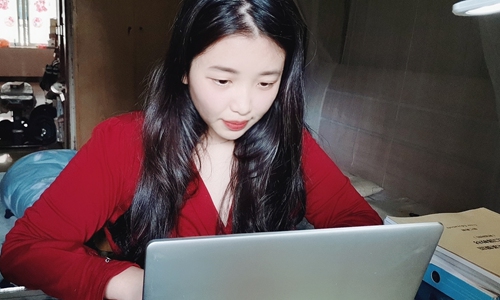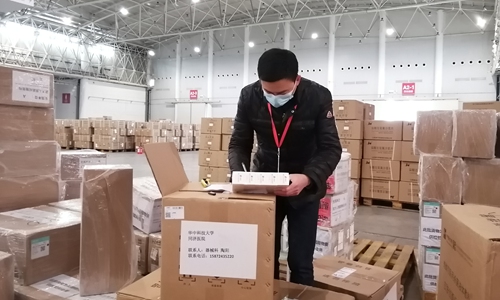HOME >> CHINA,SPECIAL-COVERAGE
Volunteer translators burn midnight oil to ensure smooth delivery of overseas medical aid to Wuhan
By Du Qiongfang Source:Global Times Published: 2020/2/6 18:11:22

Photo: Volunteer Chen Sitong.
Since the nationwide outbreak of the coronavirus epidemic stemming from Central China's Wuhan in Hubei Province, the whole slew of medical supplies donated to the hospitals by warm-hearted Chinese and foreign nationals has continued to manifest a saga of benevolence and dominated headlines.
However, many of these supplies perhaps wouldn't have reached the hospitals on time owing to variations in the standards of medical equipment in China and other countries, had some warm-hearted volunteers not chipped in.
A group of 1,982 people emerged as a gleam of hope as they volunteered to translate foreign countries' 38 standard criteria of medical equipment, from foreign languages to Chinese, amounting to a word count of 272,600 characters.

Photo: Volunteer Tang Zhou, official of Wuhan Municipal Administration for Market Regulation checks medical supplies at Wuhan International Expo Center.
The volunteers range from translation professionals to students of foreign language majors to freelancers. "When our country is facing an imminent crisis, each one of us wants to make an effort. The more donated medical supplies can be used, the more frontline doctors can be protected, thus more parents can feel at ease," said Chen Sitong, a postgraduate student majoring in law and translation from Guangdong University of Foreign Studies.
"We hope our efforts can help contain the epidemic at the earliest so that our friends and relatives in Wuhan can soon resume their normal life and work," Chen said.
According to Chen, the team arranges veteran translators with medical translation experience or with related background, and university teachers to review and proofread to attain precise translation.
"Many of the foreign standards are experiment reports or academic thesis, so we often have to consider the wordings carefully," Chen said.
"We treat every document with equal seriousness and caution to guarantee the safety of the doctors," said Sun Lin, a junior English language major from Beijing Foreign Studies University who is tasked with reviewing and proofreading the translations.
Even volunteers overseas offered help. "It was very difficult to check the brands of a lot of protective gear. Several translators based in Japan helped us find the information of the brands," said Pan Yuling, a 34-year-old part-time translator from Japan, based in Fuzhou, Fujian Province.
"Most of our tasks were handed over to us in the evening or late at night when the translation group finished their job. In order not to delay shipment we tried not to procrastinate the tasks till the next day," said Sun adding that many volunteers overseas also proactively helped with the tasks despite the time difference.
Tang Zhou, an official of Wuhan Municipal Administration for Market Regulation responsible for the supervision of medical equipment, led the team of volunteers.
After the outbreak of the epidemic, Tang was assigned to the Wuhan emergency support group of novel coronavirus pneumonia prevention and control department, a new department responsible for collecting product quality standards for domestic and overseas medical supplies.
According to Tang, the translation team was formed on January 27 with 1,982 volunteers who were categorized and added to 26 WeChat groups, according to their language majors and responsibilities. Support from the volunteers helped to ease the workload, Tang added.
Most of the volunteers are English, Japanese and Korean language translators, since European countries such as Germany, France, and even Russia use European standards which are printed in English.
Xu Aijie, who obtained his master's degree from Hankuk University of Foreign Studies, has been working as a part-time translator of Korean language for six years. According to Xu, South Korea has its own product standards for masks, which do not match the international criteria. Xu and other translators in the Korean group dug through dozens of thesis to find four South Korean standards matching the Chinese criteria.
However, the most challenging aspect of the job is the translators sometimes misunderstand the tasks as a paid job. As the group leader of the Japanese translators, Pan had to explain to newcomers that their job is unpaid. "I was gratifying that veteran translators from the translators' association extended their support, which included Chen Guangqi and Chen Yuming from Shenzhen Translators Association," Pan said.
Posted in: SOCIETY,FEATURE